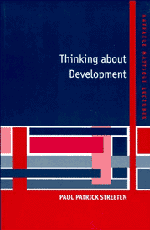FOURTH LECTURE
Markets and States: Against Minimalism and Dichotomy
Published online by Cambridge University Press: 05 February 2015
Summary
Introduction
If we call the doctrine that the “correct” prices and markets have an important role to play in allocating resources efficiently and equitably, in promoting choices, in enlarging freedom, and in decentralizing power, Pricism, and the doctrine that efficiency, equity and liberty call for minimum state intervention State Minimalism (or laissez-faire), the currently prevailing view is that the two go together: get the government off our backs and let there be markets! The thesis of this lecture is the opposite: that for the proper working of markets strong, and in many cases expanded, state intervention (of the right kind, in the right areas) is necessary. It is possible to favour a strong state, with a limited agenda. It would confine itself to ensuring that individuals, and the social groups in which they associate, can pursue their own purposes with a minimum of frustration. This is not the thesis of this lecture. It argues for a strong state, with an expanded agenda, though a different one, differently implemented, from that which the state has commonly adopted in many developing countries.
The expression “getting prices right” has undergone a curious transformation. In the 1960s it was intended to point to the calculation of correct shadow or accounting prices in the face of “distorted ” market or actual prices.
- Type
- Chapter
- Information
- Thinking about Development , pp. 195 - 234Publisher: Cambridge University PressPrint publication year: 1995

